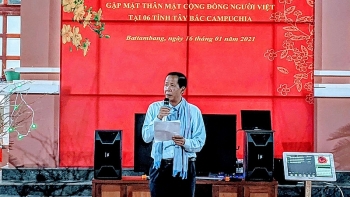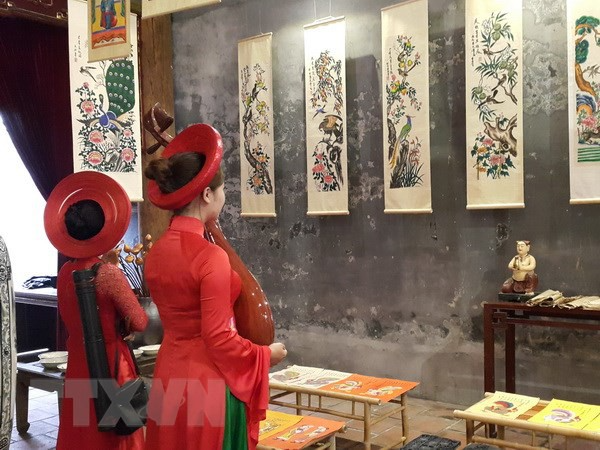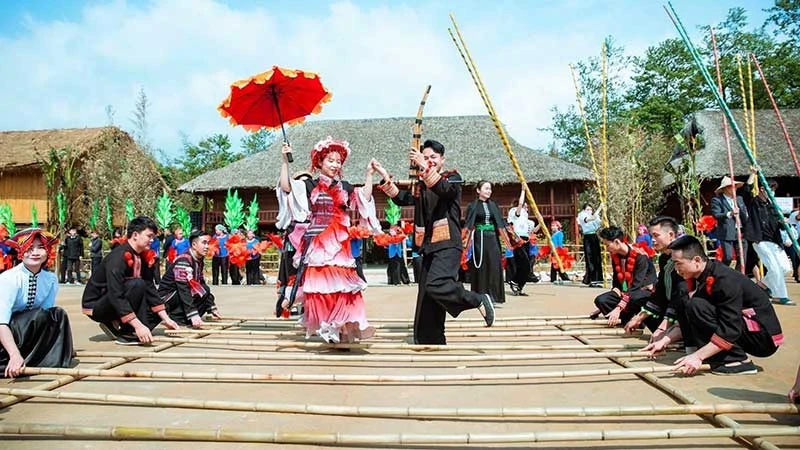Lunar New Year: History, significance and celebrations
| Da Nang leaders meet expats living in the city ahead of Tet | |
| Vietnamese community in Cambodia get-together to welcome Lunar New Year | |
| Hanoi to recreate traditional Tet Holiday in Hanoi's Old Quarter |
The history of Lunar New Year
Chinese New Year has a far-reaching history of over 3,800 years. The origin of the festival can be traced back to the worshiping activities in China’s ancient agrarian society. The date for the ceremony wasn’t fixed till the Han Dynasty (202 BC - 220 AD), when Emperor Wudi commanded to use the lunar calendar. From its ancient origins in Shang Dynasty (17th century BC - 1046 BC) to present day, the festival has several names such as Yuanchen, Yuanri and Yuandan.
The name of 'Year', 'Nian' in Chinese, emerged in the Zhou Dynasty, and worshiping performance turned to be social practice to observe the beginning of farming work in spring. Not only worshiping ancestor and praying for good harvest, people also began to enshrine Kitchen God, Gate God, Joy God, Wealth God, and Well God.
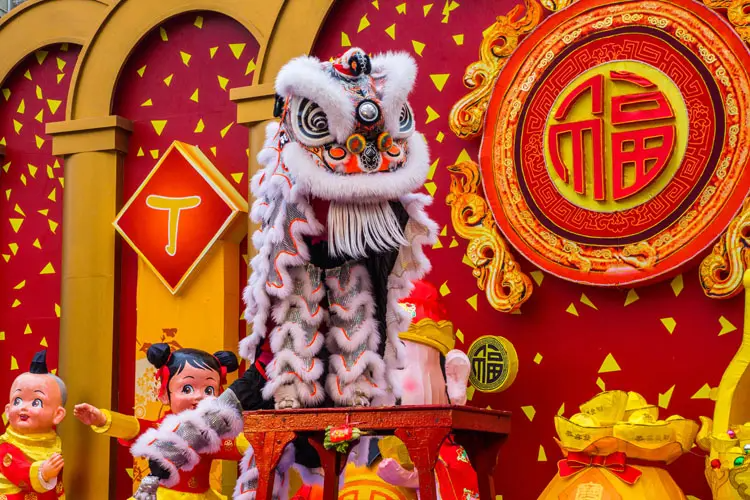 |
| CHINESE NEW YEAR LION DANCE (Photo: China highlights) |
In the Qin Dynasty (221 - 207 BC), the turn of a year cycle was called Shangri, Yuanri and Gaisui, and the 10th lunar month was taken as the start of a new year cycle. In Han Dynasty, the festival was called Suidan or Zhengri. People had partially got rid of the belief in divinities and ancestors, but stressed more on the festival's association with life.
The festival date had been finally entrenched since the Emperor Wudi of Han Dynasty fixed it on the first day of the first month in Chinese lunar calendar, which was of great significance in Chinese New Year history, for the date has been using for thousands of years till now. At that time, the festival had become a nationwide event. There was a big carnival launched by the government, and civil servants gathered for celebration. New activities also arose, such as staying up at night, burning bamboo, which is just like setting off fireworks nowadays, as well as hanging peach boards, which later became the Spring Festival couplets.
From Song Dynasty to Qing Dynasty (1644 - 1911 AD), the Lunar New Year had been named Yuandan, and the celebrations were more of social interaction. People began to visit friends, relatives and gave gifts to sharing blessing. More interesting activities such as dragon dance, lion dance, walking on stilts and Shehuo performance were getting popular in this period.
In 1912, the government decided to abolish the Lunar New Year and the lunar calendar, but adopted the Gregorian calendar instead. People were unwilling to change the tradition, so the policy did not carry out successfully. A compromise was made that both calendar systems were kept, and the Gregorian calendar used in government, factory, school and other organizations while lunar calendar used for traditional festivals. The first day on Gregorian calendar, the New Year's Day, was called Yuandan, while the first day on the lunar calendar was called Chunjie (Spring Festival), which is the present widely celebrated Chinese New Year.
After 1949, the Spring Festival was listed as a nationwide public holiday, and people got days off work and school. Today, it is the most important traditional festival in China, and many old customs are inherited from the long Chinese New Year history.
Chinese Zodiac
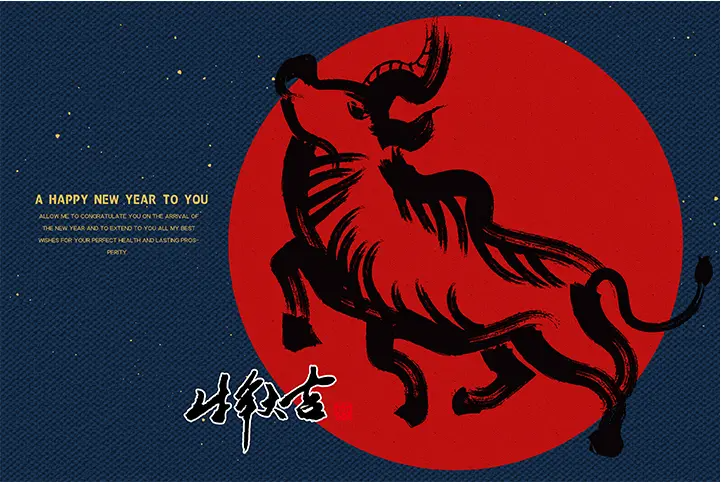 |
| 2021 IS A YEAR OF THE OX. (Photo: China highlights) |
The Chinese Zodiac, or Sheng Xiao (生肖), is a repeating 12-year cycle of animal signs and their ascribed attributes, based on the lunar calendar. In order, the zodiac animals are: Rat, Ox, Tiger, Rabbit, Dragon, Snake, Horse, Goat, Monkey, Rooster, Dog, Pig.
The Lunar New Year, or Spring Festival, marks the transition from one animal to the next—2020 is the year of the Rat, which began on January 15th, 2020, and ends on February 11th, 2021. February 12th, 2021 (Chinese New Year) will signal the start of the year of the Ox.
It is generally believed the origins of the Chinese zodiac are rooted in zoolatry, or animal worship, with the system dating back to the Qin dynasty, more than 2,000 years ago.
Legend has it that the Jade Emperor summoned all the animals to his palace in a “Great Race” (or possibly for a banquet), and the order in which they arrived determined the animal’s place in the zodiac.
With such a rich past, it’s little wonder the Chinese zodiac remains so popular throughout China and much of Asia. An integral part of everyday life, it’s used to determine your fortune for the year, marriage compatibility, career path, best times to have a baby, and so much more.
Significance
Early celebrations emphasised the importance of family, and the tradition continues today. People give offerings to ancestors and gods, often in the form of food and money. These offerings are expected to ensure a good new year and might even involve a little bribery.
In some homes, the lips on images of the Kitchen God (灶君) are rubbed with honey before the new year. This is done so he only has sweet things to report to the Jade Emperor (玉皇) – the principal deity – about the family’s behaviour.
Homes and cities are also given a nice scrub and adorned with red lanterns and auspicious floral arrangements and decorations, all of which is meant to scare off Nian and usher in prosperity and good fortune for the new year.
Children and unmarried adults will enjoy more immediate fortune in the form of red packets filled with money. These red packets (紅包, hóngbāo) are given by parents, elders and employers to ensure safety and comfort in the new year. Denominations vary according to the relationship with the recipient.
Lucky foods and symbolism
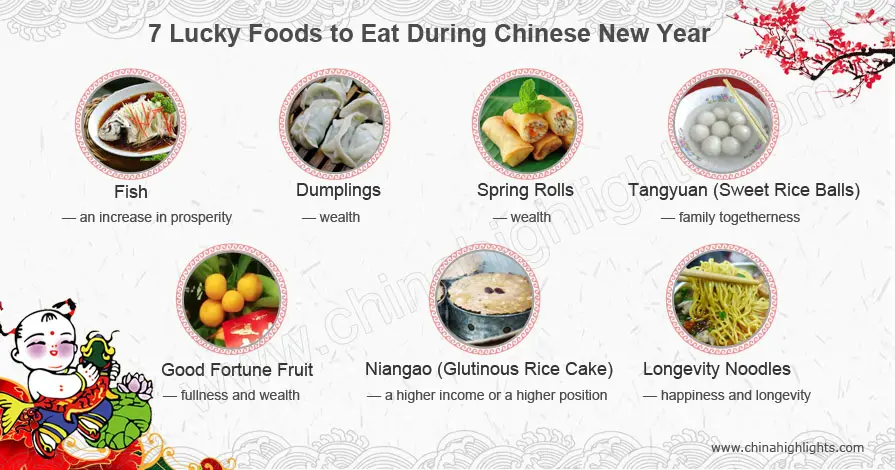 |
| 7 lucky foods to eat during Chinese New Year (Photo: Chinahighlights) |
The auspicious symbolism of these traditional Chinese New Year foods is based on their pronunciations or appearance. Not only do the dishes themselves matter, but also the preparation, and ways of serving and eating mean a lot.
Dishes with fish are a must for the new year table, because the name for fish (魚, yú) is a homophone for the word for abundance or surplus (余, yú). Eating fish is meant to ensure that abundance will carry into the new year.
Other dishes, like jiaozi (dumplings), are served in Northern China because of their appearance. Depending on the means of preparation, jiaozi can be made to look like silver ingots or gold bars, and eating them is meant to usher in wealth for the new year. Similarly, dried scallops are eaten because they look like Chinese coins.
Celebrations
The holiday is celebrated across the Asia-Pacific region, and diaspora communities around the world mean that there are Lunar New Year festivities in most major cities around the world; London’s Chinese New Year parade boasts the largest festival outside of Asia.
Laos: Lao New Year is a popular English name for a traditional celebration known in Laos as "Pi Mai" or "Songkran" (in Lao language). Lao New Year widely celebrated festival in Laos. The festival is also celebrated by the Lao in Australia, Canada, France, the UK and the US. Lao New Year takes place in April, the hottest time of the year in Laos, which is also the start of the monsoon season. Lao New Year takes place at virtually the same time as the new year celebrations of many countries in South Asia such as Bangladesh, Cambodia, China (Dai People of Yunnan Province), India, Myanmar, Nepal, Thailand, and Sri Lanka. The official festival lasts for three days from 14 to 16 April, although celebrations can last more than a week in towns such as Luang Prabang. The first day is the last day of the old year. Houses and villages are properly cleaned on the first day. Perfume, water and flowers are also prepared for the Lao New Year. The second day of the festival is the "day of no year", a day that falls in neither the old year or the new year. The last day of the festival marks the start of the new year. In Laos, Lao New Year is a government holiday, with state offices closed during those three days.
Japan: Historically, Japan used to celebrate the New Year according to the traditional lunar calendar just like China. However, during the Meiji Era, the Japanese government moved towards Westernization and adopted the Gregorian calendar with the New Year beginning on January 1.Still, the symbolic importance of Chinese zodiac animals has continued, with the animals being incorporated into Japanese New Year celebrations. Furthermore, Chinese New Year festivities are still celebrated in Japan due to the large number of Chinese migrants and their descendants who keep this important holiday alive, both for themselves and the tens of thousands of visitors to the festivals.
Thailand: Many Thais trace their roots to China. Officially, 14% of the population of Thailand is Chinese, but depending on current fashion, a far greater percent may identify themselves as "Thai-Chinese". Whatever the facts may be, most Thais like any excuse for a party - or a sale - and the "Chinese" or Lunar New Year is no exception. The holiday is celebrated all over Thailand, especially in those areas with large populations of Chinese, such as Bangkok, where the city's Chinatown area is usually the scene of a large block party. It's important to note that, while there may be large celebrations on the day, the Lunar New Year is not an official national holiday. Government offices and services remain open. Some businesses may close for the day, especially when it lands on a Monday or Friday, but as with every other holiday in Thailand, most shops will remain open for business as usual.
| Vietnam: Tet holiday – Vietnamese Lunar New Year or simply Tet Vietnam is the most significant festival in the S-shaped country. As a result of being calculated by the lunar calendar, the Tet festival often occurs at the end of January or the beginning of February, which is later than New Year’s Day. As the longest Vietnam holiday, Tet Vietnam is the most wonderful occasion for all foreign tourists to spend their Vietnam vacation packages enjoying the festive atmosphere and exploring one of the oldest festivals in the world. Tet Vietnam is celebrated to welcome the Lunar New Year and summarize what they did in the old one. It is considered an important mark for changes, plans, and progress. In addition, Vietnamese people believe that what they do on the first day of the new year will affect their rest. Therefore, they pay great attention to every word they say and everything they do. Furthermore, Tet in Vietnam may be the only occasion for all family members to have happy moments together after a year of hard-working. |
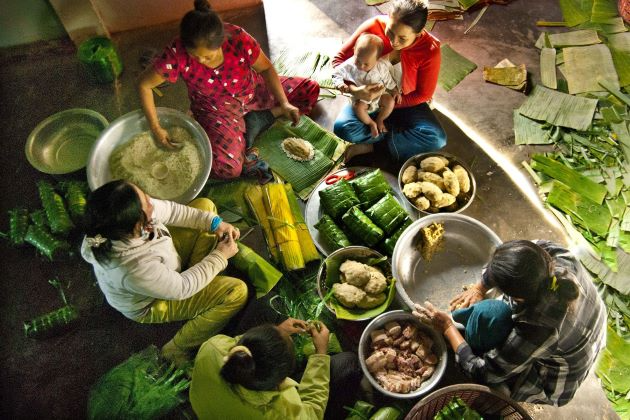 |
| A family is making traditional Chung cakes on the Tet holiday (Photo: Vietvisiontravel) |
Taboos to avoid during Lunar New Year holiday
1. Avoid taking medicine:
It is a taboo for a person to brew herbal medicine or take medicine on the first day of the lunar year, otherwise it is believed he or she will get ill for a whole year.
In some places, after the bell announcing the New Year at midnight New Year's Day, sickly people break their gallipots (medicine pots) in the belief that this custom will drive the illness away in the coming year.
2. Don't sweep or take out garbage.
The act of sweeping on this day is associated with sweeping wealth away. Taking out garbage symbolizes dumping out the good luck or good fortune from the house.
3. Don't wash clothes and hair.
People do not wash clothes on the first and second day, because these two days are celebrated as the birthday of Shuishen (水神, the Water God).
Hair must not be washed on the first day of the lunar year. In Chinese language, hair (发) has the same pronunciation (and indeed is the same character) as fa in facai (发财), which means 'to become wealthy’. Therefore, it is seen as not a good thing to “wash one’s fortune away” at the beginning of the New Year.
4. Needlework should not be done.
The use of knives and scissors is to be avoided for any accident, whether harming a person or tool, is thought to lead to inauspicious things and the depletion of wealth in the coming year.
5. A married daughter is not allowed to visit the house of her parents.
A married daughter is not allowed to visit the house of her parents, as this is believed to bring bad luck to the parents, causing economic hardship for the family. Traditionally a married daughter visits the house of her parents on the second day of Chinese New Year.
6. Keep children from crying.
The cry of a child is believed to bring bad luck to the family, so parents do their best to keep children from crying by whatever means possible.
7. Avoid breaking tools or other equipment
Breaking tools or other equipment during this period is associated with a loss of wealth for the coming year; therefore tradesmen and business people in general take great precautions to prevent it.
9. No visiting hospital.
A visit to the hospital during this period is believed to bring illness to the person in question for the duration of coming year; therefore visits to the hospital are avoided, except in cases of extreme emergency.
10. Avoid being stolen.
Do not let other people take objects, including money, from your pocket during the Spring Festival, and take care not to have your pocket picked, as this is believed to portend your whole wealth in the coming year being stolen.
11. Avoid borrowing money.
Don't borrow money during Chinese New Year.
Money should not be lent on New Year’s Day, and all debts have to be paid by New Year’s Eve, and, if someone who owes you money, do not go to his or her home to demand it. Anyone who does so it is said will be unlucky all the year.
12. The rice jar should not be empty.
The rice jar should not be allowed to become empty. This causes grave anxiety, as the cessation of cooking during the New Year period is an ill omen.
13. Don't wear damaged clothes.
Do not wear clothes that are damaged. If kids especially wear such clothes in the first lunar month, it is said to bring bad luck.
14. No killing.
Killing should be avoided from the 1st to 15th of the Lunar New Year as blood is considered an ill omen, which will cause misfortunes such as a knife wound, or a bloody disaster. People usually kill chickens, ducks, pigs and fishes before Chinese New Year or on Chinese New Year's Eve.
15. Do not wear white or black.
Do not wear white or black clothes as these two colors are associated with mourning traditionally.
16. Don't give certain gifts.
Don't give certain gifts, like clocks, scissors, and pears, as they have a bad meaning in Chinese culture. Read more on what not to give at Chinese New Year.
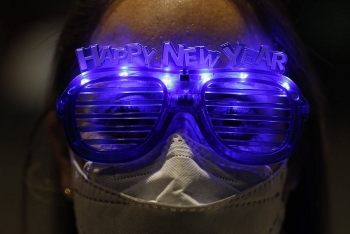 | In photos: New Year's Eve around the world with pandemic controlling muting celebrations While freshes wave of coronavirus have sparked renewed lockdowns, the world began ushering in the New Year with pandemic controlling muting celebrations. Here are the ... |
 | Pope Francis to skip New Year's Eve masses due to sciatic pain Pope Francis will skip the 2021 New Year's Eve and New Year's Day celebrations hosted by the Vatican due to sciatic pain. |
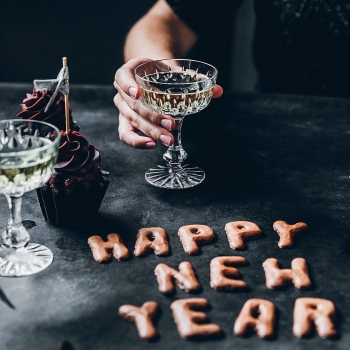 | New Year 2021: Best things to do on this New Year's weekend to start it right While many events have either been postponed or canceled during the coronavirus pandemic, some organizations have pivoted to virtual or socially-distanced events to continue offering ... |
Recommended
 World
World
Pakistan NCRC report explores emerging child rights issues
 World
World
"India has right to defend herself against terror," says German Foreign Minister, endorses Op Sindoor
 World
World
‘We stand with India’: Japan, UAE back New Delhi over its global outreach against terror
 World
World
'Action Was Entirely Justifiable': Former US NSA John Bolton Backs India's Right After Pahalgam Attack
 World
World
US, China Conclude Trade Talks with Positive Outcome
 World
World
Nifty, Sensex jumped more than 2% in opening as India-Pakistan tensions ease
 World
World
Easing of US-China Tariffs: Markets React Positively, Experts Remain Cautious
 World
World


